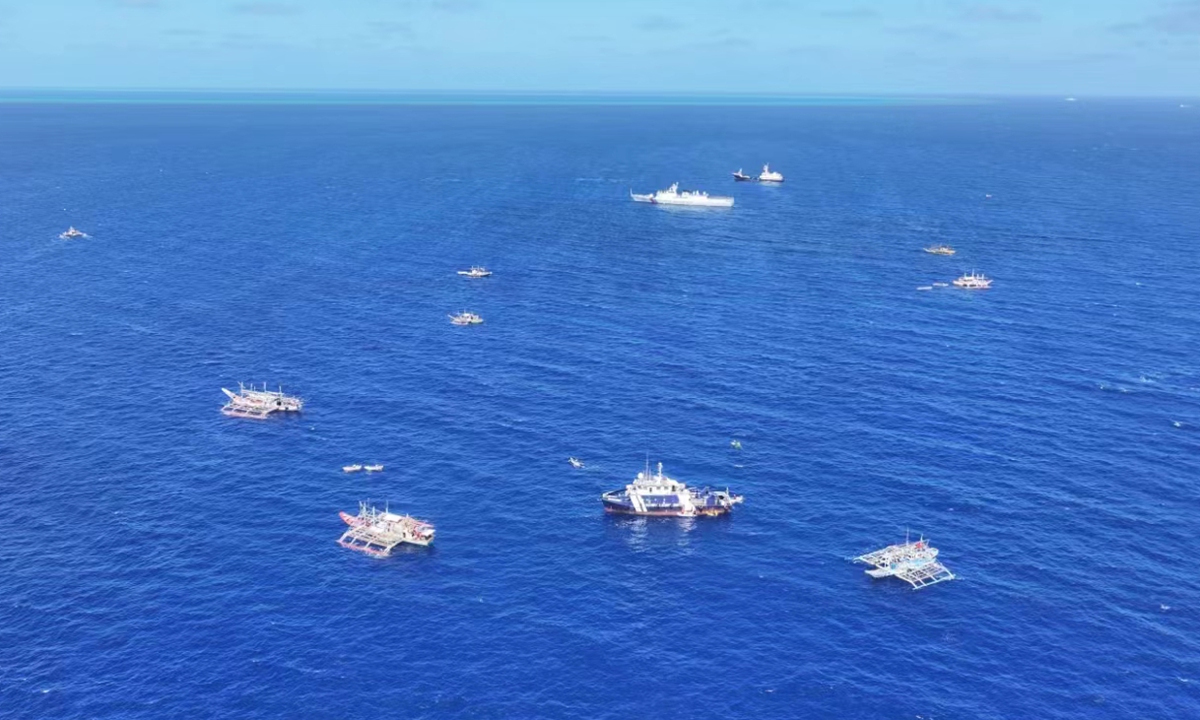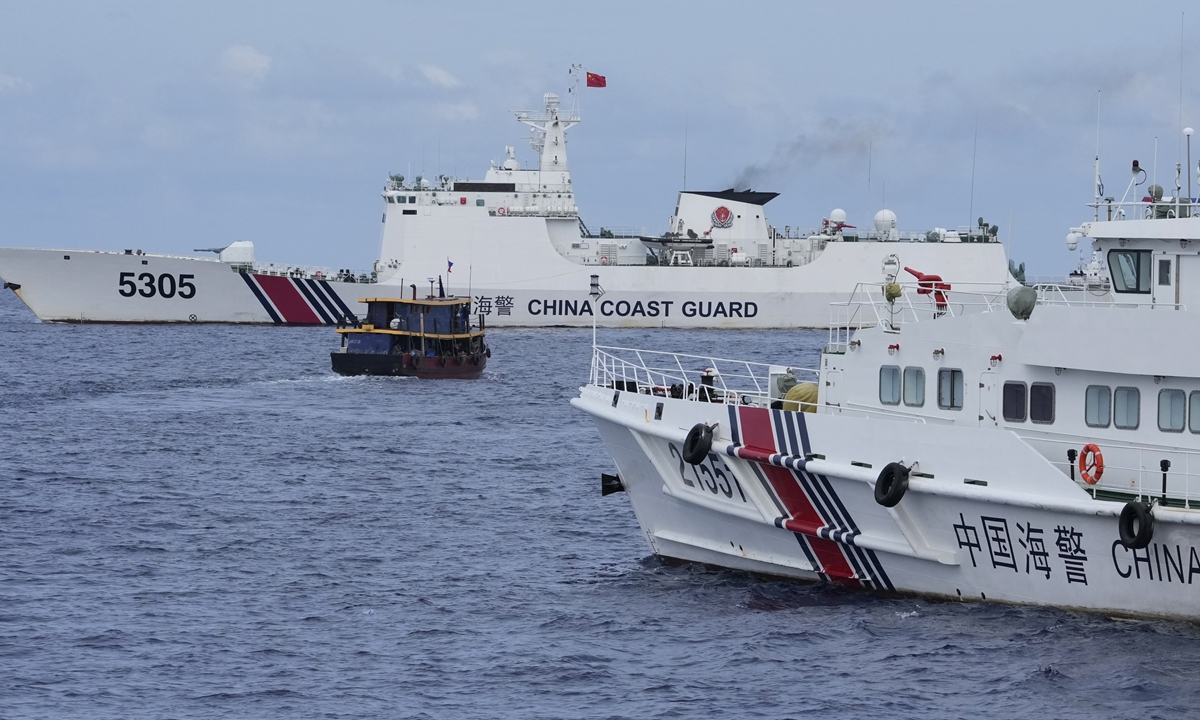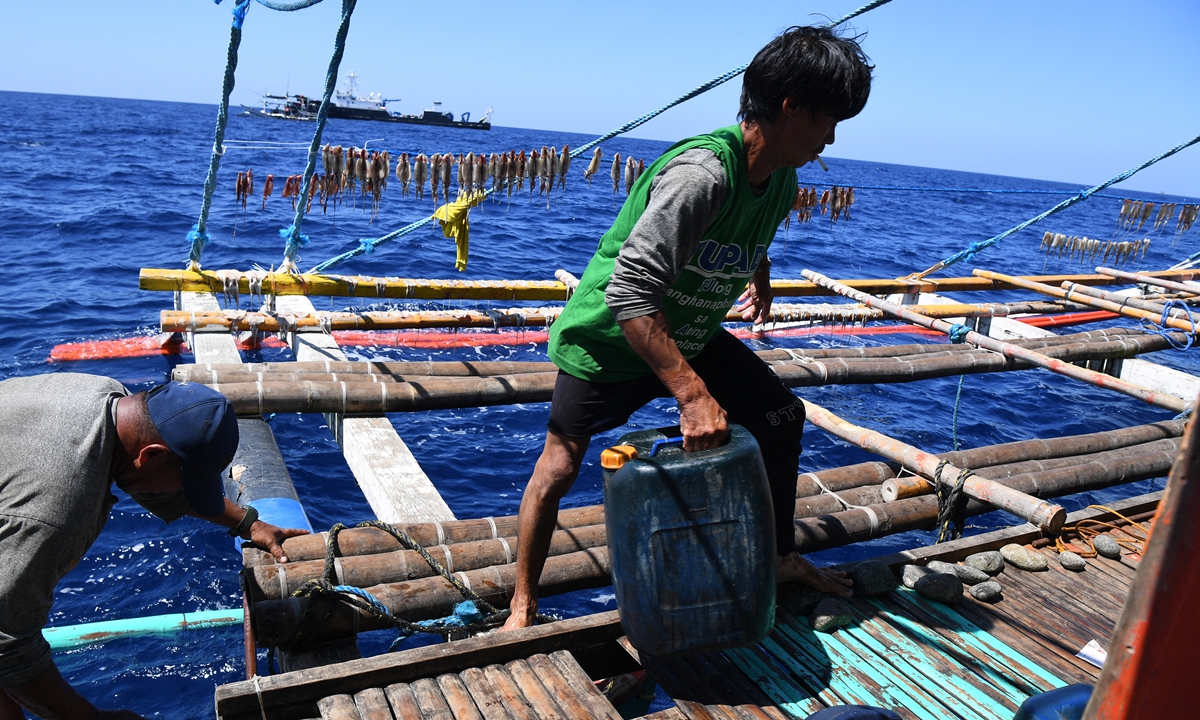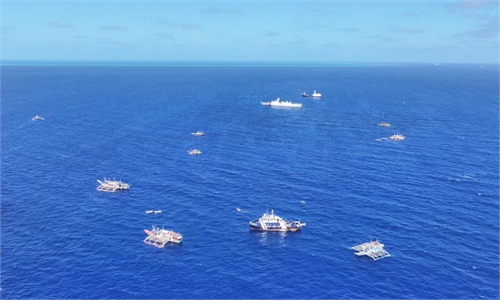GT investigates: The Philippines uses fishermen’s livelihoods as a cover in an attempt to control Huangyan Dao
The Philippines uses fishermen’s livelihoods as a cover in an attempt to control Huangyan Dao

A group of Philippine fishing vessels illegally intrude waters off China's Huangyan Dao in the South China Sea last week in an organized, provocative manner. Photo: Courtesy of a source familiar with the matter
Since 2023, the Philippines has been dispatching batches of government vessels and fishing ships to intrude on and provoke disputes in the South China Sea, especially near China's Huangyan Dao (also known as Huangyan Island), under the pretext of "ensuring the security of Filipino fishermen."
Interestingly, the fishing activities have not been disrupted since 2016 when China offered a provisional arrangement for Philippine fishermen, a move that has since become a problem due to the Philippines' decision to "protect them."
In this investigative piece, the Global Times presents evidence showing that some fishing ships were "hired guns," trained and controlled by the Philippine government through military conscription and government subsidies.
Chinese analysts say it clearly shows that the Philippine government's actions are geared toward eventually controlling Huangyan Dao. If the Philippines truly cares about the fishing rights and interests of its fishermen, it would stop its abuses and unilaterally sabotage the foundation of Beijing's goodwill to Manila that temporarily allows Philippine fishermen to operate near Huangyan Dao, rather than aggravating the situation by sacrificing the livelihoods of fishermen to satisfy the ambitions of some politicians.

The China Coast Guard issues stern warnings and follows a Philippine vessel that illegally intruded into Ren'ai Jiao (also known as Ren'ai Reef) in the South China Sea, in August 2023. Photo: Visual News
Deploy fisherfolk militia
Recently, the Philippines deployed a number of civilian ships to illegally intrude into waters adjacent to Huangyan Dao. These boats were funded with official subsidies, and used fishing activities as cover, abusing China's goodwill, violating China's sovereignty and jurisdiction, and leading to aggravation of the maritime situation, a source close to the matter told the Global Times on Sunday.
This can be seen as the latest move by the Philippine military, which stated in last August that the militia will be drawn from the Armed Forces of the Philippines (AFP)'s reserve force and possibly among fisherfolks.
The Philippines plans to deploy its own maritime militia to "defend its sovereignty" amid a raging territorial row with China, Gen. Romeo Brawner Jr., the Filipino armed forces chief said on August 10, 2023, as he visited an island on the frontline of the maritime dispute, Benar News reported.
"We want our fisherfolk to become reservists and teach them how to help in defending the country," the official said in a statement.
"It's already being implemented. We have established reserve units, but we are going to wait for the platforms or the vessels that actually would be used," the chief said, emphasizing that the way forward "depends on the funds."
The source of funding could come from the confidential and intelligence fund in the 2024 budget. A total of 1.23 billion Philippine pesos ($20 million) in confidential funds from the 2024 budget were distributed to agencies at the forefront of efforts to assert the Philippines' alleged territorial rights in the South China Sea, according to a statement by the Philippines' House of Representatives on October 10, 2023.
In addition to financial support, the Philippine authorities have also been increasing efforts to provide supplies and subsidies to fishing vessels.
On February 23, the Philippines' Bureau of Fisheries and Aquatic Resources (BFAR) publicly acknowledged that "it would also continue to carry out its duty of distributing fuel subsidies to the Filipino fishing boats that are present in the area to support their prolonged fishing activities."
"From public reports, we see that Philippine official vessels are specifically providing collective supplies for fishing boats on site. Such an expensive service for 'private fishing boats' is truly rare," said Yang Xiao, deputy director of the Institute of Maritime Strategy Studies, China Institute of Contemporary International Relations.
"A series of evidence fully indicates that the Philippines has planned and organized to incite its fisherfolks to carry out long-term occupation and provocations in the South China Sea," Yang told the Global Times.
Recently, a large amount of "video evidence" from the Philippine side has appeared on social media sources, most of which is from the visual angle of so-called Philippine "fishermen."
A number of these "civilian vessels" track and monitor Chinese coast guard vessels with some recording and gathering so-called "evidence" of the China Coast Guard (CCG)'s operations, while some trespassing into the reefs of China's Huangyan Dao to illegally catch seashell… These videos are then used as an "evidence" by the Philippine Coast Guard to defame China's professional and restrained action in the South China Sea.
In the video, one can also notice that the methods of these so-called fishermen appear very professional, and they repeatedly provoke the extremely restrained Chinese law enforcement vessels and personnel on site, Yang pointed out.
"The disclosure of these videos demonstrates that the local Filipino personnel are not private fishermen focused on fishing at all, but are entirely serving as militia for provocative actions. They are serving a premeditated, malicious cognitive warfare launched by the Philippine government," said Yang.
The Philippine government incites these fishermen to be stranded in the vast sea for a long time and never considers the harsh conditions of life at sea, said the expert. "This on the contrary shows that the Philippines is turning a deaf ear to the right to life and health of its people."
Opposition voices are already growing in the Philippines.
In August 2023, a Philippine fisher group on the Philippines' illegally occupied Zhongye Dao (also known as Zhongye Island) turned down a recent suggestion from the Armed Forces of the Philippines to train fisherfolks to help defend the West Philippine Sea as military reservists, local media source Philstar reported.
The group's President Larry Hugo said that it would be "difficult" for them to undergo military training and that he would prefer not to carry firearms.

This photo taken on February 15, 2024 shows Filipino fishermen loading plastic containers with free fuel from the Philippine Bureau of Fisheries and Aquatic Resources (BFAR) ship (background) near the Huangyan Dao in the South China Sea. Photo: AFP
Sabotage Beijing's goodwill
The Philippines has frequently advocated for the livelihood of the fisherfolks since 2023.
According to Jay Tarriela, the spokesperson of the Philippine Coast Guard, the Philippines has sent governmental vessels to "ensure the security of Filipino fishermen."
"Fishing activities have never been interfered with since 2016 when China offered the provisional arrangement for the Philippines' fisherfolks, while it now it has become a problem as the Philippines has decided to protect them by sending government vessels to invade the territory of Huangyan Dao," Lei Xiaolu, professor of law at the China Institute of Boundary and Ocean Studies, Wuhan University, told the Global Times.
As we all know, there is a territorial sovereignty dispute over Huangyan Dao between China and the Philippines. Although China neither accepts nor recognizes the South China Sea Arbitration, in 2016, China made a special arrangement for the Philippines' fishermen to maintain their small-scale artisanal fishing activities around Huangyan Dao under humanitarian considerations.
From 2016 to 2023, China has always kept the commitment. Despite the territorial and maritime disputes between the two sides, the livelihood of the fisherfolks has never been affected, Lei noted.
"This represents China's goodwill to maintain the peace and stability of the region, as well as to promote the development and prosperity of all people," Lei stressed.
However, the status quo has been changed since the Philippines began to send government vessels to the territorial sea of Huangyan Dao in the second half of 2023. In this case, China had to respond and repel the government vessels.
However, since 2024, the Philippines has conducted more and more provocations. The Philippine fishery vessel group was reportedly accompanied by the Ship 3002 which belongs to the Philippines' Bureau of Fisheries and Aquatic Resources when they trespassed waters off Huangyan Dao, and according to a statement by Gan Yu, a spokesperson at the China Coast Guard (CCG), the CCG repelled this particular ship in accordance with the law when it ignored repeated warnings from the Chinese side and insisted on illegally intruding into waters adjacent to Huangyan Dao from Febraury 24 to 25.
"Even so, China has shown great restraint. It did not name the specific activities of the fishermen in the CCG statement. The CCG only repelled the Philippines' government vessel 'illegally intruding.' It is clear that China has expressed its goodwill to the fisherfolks while defending its sovereignty," Lei said.
But increased evidence shows that those civilian fishing vessels are organized, sponsored, or even controlled and authorized by the Philippine government, according to the expert.
"It is not appropriate to use the livelihood of the fishermen as an excuse to satisfy the ambitions of certain politicians. If the Philippines was thinking of the livelihood of the fisherfolks, it would return to the 'gentlemen's arrangement' with China, rather than leading to the aggravation of the situation," Lei said.
Hiring fishermen to cause trouble in specific waters, then sending government ships to regularly supply them with fuel, and then turning around to accuse China of conducting law enforcement activities on the scene, the Philippines has staged another ugly farce at Huangyan Dao, similar to how they grounded their warship on Ren'ai Jiao, Yang suggested.
All of these conspiracies were made possible because China's goodwill and restraint were abused by the Philippines. This evil act of disregarding commitments has greatly harmed the security and development of the South China Sea region, Yang said.


